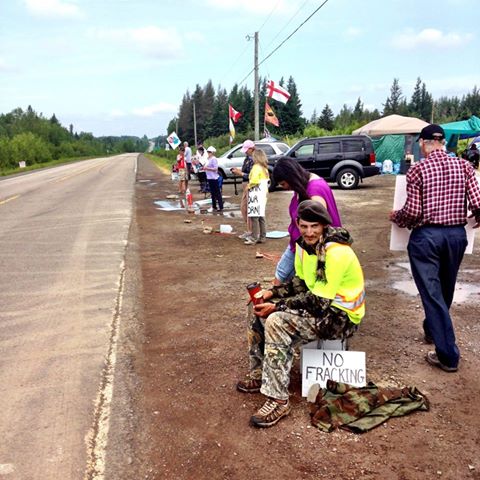Please support our coverage of democratic movements and become a supporting member of rabble.ca.
Tensions are rising at the Highway 126 anti-fracking camp near Elsipogtog First Nation in Kent County, New Brunswick (traditional regional name: the Wabanakik). With the total number of arrests climbing from 17 to 29 on Friday, National Aboriginal Day — and the heat of last weekend’s confrontation, which led to the hospitalization of a community member, still heavy in the air — a sense of momentum is palpable.
Warrior society members (AKA Warriors) are gaining a more pronounced presence following the recent call-out by local Warrior Chief John Levi, and the number of tents occupied by Indigenous and non-Indigenous supporters from across the country is growing by the day.
The camp was established three weeks ago in response to ongoing seismic testing activity by Southwestern Energy (SWN) aiming to pave the way for future fracking activities approved by the provincial Alward government. The Mi’kmaq, Maliseet, Passamaquoddy, Acadian and other peoples of the Wabanakik have vocally denied their consent to such tests on their lands, but testing activities have nonetheless continued under the protection of the RCMP and SWN private security forces.
Protest tactics used thus far have included roadside picketing, stepping onto the highways to block trucks and, more recently, the surrounding of SWN vehicles near exploration sites. Camp statements have repeatedly affirmed the movement’s commitment to peaceful resistance, but the aggressive tactics being practiced by both private security forces and the RCMP have led to a number of confrontations. Accounts of private security and police intervention have included threats to run over protesters, the theft of SIM cards from cell phones by undercover RCMP officers, and the physical assault of an elder.
However, these tactics have failed to discourage further resistance: recent arrestees have returned to the camp with no intention of relenting. “They’re destroying our land … If we got off that road, those trucks were just going to drive right by,” explained Elsipogtog First Nation member Gilogoetj Dedam. “By us getting arrested, we’re not making them stop, but at least we’re making them slow down. . . I pray hard that they [SWN] just go back home to the United States.”
Dedam was arrested during the most recent bout of detentions last Friday, along with a pregnant woman and several Elders. “We were being totally peaceful,” she stressed, “but they [the police] got violent by the second wave of arrests.” Dedam reported violent shoving of herself and other protesters, the denial of water and bathroom access to arrestees, and refusal to adjust zip-tie cuffs to the point of bruising.
Despite the adverse conditions of its creation, the atmosphere at the camp remains welcoming and positive. A sacred fire is tended to in the centre of the camp, and a line of open tents house a communal kitchen and gathering space. Spirited conversation punctuated by singing and drumming creates a warm community environment, and the flux of visitors and new campers are met with introductions to other campers and protocol, and invitations to share in the camp’s food and shelter.
As of 10:00pm Monday, there were approximately 45 people on site with ages ranging from young children to elders. With the combination of strong internal community building and the challenge of an increasingly adversarial opponent, stability — if not an increase — in these numbers is likely.
“We’re not leaving here till they pack up their trucks and leave,” insisted Warrior Chief Levi. By all accounts, the camp’s commitment to this end cannot be doubted, and the convergence of supportive voices is growing. More to come soon.



